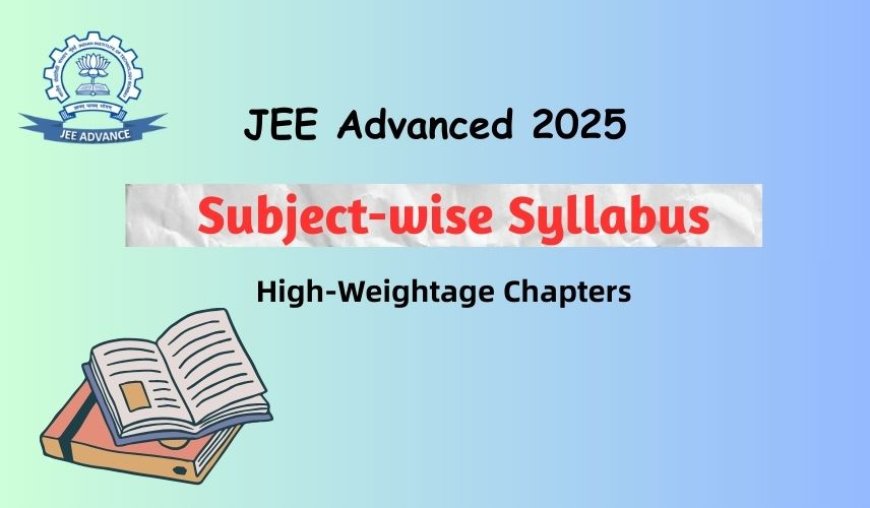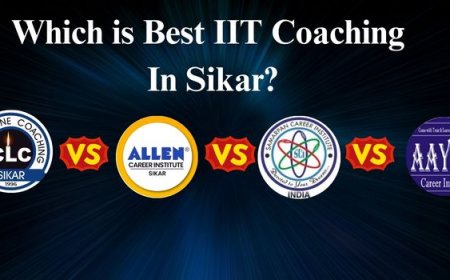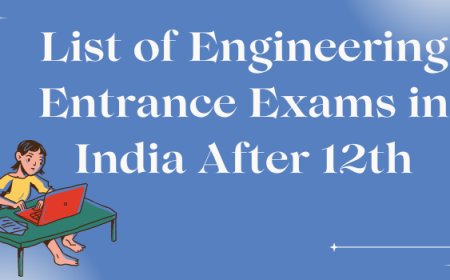JEE Advanced 2025: Subject-wise Syllabus and High-Weightage Chapters
Explore the JEE Advanced 2025 subject-wise syllabus and high-weightage chapters to boost your preparation and improve your exam score.

The JEE Advanced 2025 exam is conducted by the Indian Institute of Technology Kanpur (IIT Kanpur). Students who want to sit for the Jee advanced 2025 exam need to qualify for the JEE Main 2025 exam and hold the top position among 250,000 candidates in all categories. The JEE Advanced 2025 syllabus is declared on the JEE Advanced official website, https://jeeadv.ac.in/. JEE Advanced 2025 will be held on May 18, 2025 for two papers spanning from 9:00 AM to 12:00 PM for Paper 1 while Paper 2 will be conducted from 2:30 PM to 5:30 PM The JEE Advanced 2025 syllabus includes Physics Chemistry and Mathematics as the main subjects.
JEE Advanced 2025 Syllabus:
Students should maintain focus on high-weightage core topics from the JEE Advanced 2025 syllabus which has been released by IIT Kanpur as a PDF download document. The syllabus presents all essential content for Physics together with Chemistry and Mathematics which candidates should study to succeed in the examination.
JEE Advanced 2025 Syllabus: Subject-wise breakdown
The JEE Advanced 2025 curriculum encompasses three major subjects: Physics, Chemistry and Mathematics to examine both subject comprehension and problem-solving mastery of students. The syllabus for JEE Advanced 2025 follows NCERT Class 11 and 12 concepts but introduces advanced concepts and numerous application problems for testing candidates' mastery. The comprehension of specific syllabus content aids students in organizing their study plan and focus on High weightage chapters for JEE Advaced 2025 Exam.
JEE Advanced 2025 Physics Syllabus
|
Units |
Physics Important topic. |
|
Mechanics
|
|
|
Kinematics: Study of motion, displacement, velocity, and acceleration. |
|
|
Work, Energy, and Power: Understanding energy conservation and transformations. |
|
|
Rotational Motion: Analysis of objects rotating about an axis. |
|
|
Newton's Laws of Motion: Fundamental principles governing force and motion. |
|
|
Gravitation: Law of universal gravitation and its applications. |
|
|
Oscillations and Waves: Simple harmonic motion and wave phenomena. |
|
|
Fluid Mechanics: Behavior of fluids at rest and in motion. |
|
|
Modern Physics |
|
|
Atomic Models: Bohr's Model and Quantum Theory. |
|
|
Nuclear Physics: Radioactivity, Fission, and Fusion. |
|
|
Semiconductors: PN junctions, diodes, and transistors. |
|
|
Photoelectric Effect: Emission of electrons from a material when illuminated. |
|
|
Electricity and Magnetism |
|
|
Electrostatics: Electric charges, fields, and potential. |
|
|
Electromagnetic Induction: Faraday's Law and Lenz's Law. |
|
|
Current Electricity: Ohm's Law, Resistors, and Circuits. |
|
|
Alternating Current: AC circuits and their behavior. |
JEE Advanced 2025 Chemistry Syllabus
|
Unit |
Chemistry Importaent topic |
|
Physical Chemistry |
|
|
Atomic Structure: Electron configuration and periodicity. |
|
|
Chemical Bonding: Ionic, covalent, and metallic bonds. |
|
|
Thermodynamics: Laws of thermodynamics and their applications. |
|
|
Mole Concept: Understanding the amount of substance. |
|
|
Equilibrium: Chemical and ionic equilibria. |
|
|
Electrochemistry: Electrochemical cells and their applications. |
|
|
Chemical Kinetics: Rate of reactions and factors affecting it. |
|
|
Surface Chemistry: Adsorption, catalysis, and colloids. |
|
|
Redox Reactions: Oxidation-reduction processes. |
|
|
Organic Chemistry |
|
|
Basic Principles: Nomenclature, isomerism, and reaction mechanisms. |
|
|
Functional Groups: Alcohols, aldehydes, ketones, carboxylic acids, and derivatives. |
|
|
Hydrocarbons: Alkanes, alkenes, alkynes, and aromatic compounds. |
|
|
Biomolecules: Carbohydrates, proteins, enzymes, and vitamins. |
|
|
Polymers: Types, methods of polymerization, and uses. |
|
|
Chemistry in Everyday Life: Chemicals in medicines, food, and detergents. |
|
|
Inorganic Chemistry |
|
|
Periodic Table and Periodicity: Trends in properties across periods and groups. |
|
|
Chemical Bonding: VSEPR theory and hybridization. |
|
|
Environmental Chemistry: Pollution and its control. |
|
|
Coordination Compounds: Ligands, Coordination Number, and Isomerism. |
|
|
d- and f-Block Elements: Transition Elements and Inner Transition Elements. |
|
|
p-Block Elements: Group-wise Properties and Compounds. |
Read More: JEE Advanced Previous Year Question Papers
JEE Advanced 2025 Maths Syllabus
|
Unit |
Maths Important topic |
|
Algebra |
|
|
Complex Numbers: Operations and properties. |
|
|
Binomial Theorem: Expansion and applications. |
|
|
Quadratic Equations: Roots and their nature. |
|
|
Sequences and Series: Arithmetic and geometric progressions. |
|
|
Permutations and Combinations: Counting principles and applications. |
|
|
Matrices and Determinants: Operations and Properties. |
|
|
Coordinate Geometry |
|
|
Conic Sections: Parabola, ellipse, and hyperbola. |
|
|
Vectors: Addition, subtraction, and scalar product. |
|
|
3D Geometry: Planes, lines, and distances. |
|
|
Straight Lines: Equation and properties. |
|
|
Trigonometry |
Trigonometric Ratios |
JEE Advanced 2025: Subject-wise High-Weightage Chapters
Your preparation for JEE Advanced 2025 becomes effective by studying chapters that appear most frequently and offer multiple mark-earning opportunities in the exam. The analysis shows that tests use important chapters as their main markers since these subjects yield maximum marks to obtain high scores. Essential knowledge and advanced problem-solving abilities are needed for important aspects found within the boundaries of Physics as well as Chemistry and Mathematics. The selection of key topics results in better study routine and produces improved performance outcomes.
JEE Advanced 2025: Physics High-Weightage Chapters
Student success depends on using this resource to determine which exam areas they should focus on since Physics requirements in JEE Advanced emphasize understanding core principles and developing aptness in real-world problem techniques. Students should dedicate additional study time to Electrodynamics together with Mechanics and Modern Physics since these topics dominate the paper with significant weight points.
|
Chapters Name |
No. of Questions |
Weightage |
|
Electromagnetic Waves |
1 |
3.3% |
|
Electrostatics |
1 |
3.3% |
|
Sound Waves |
1 |
3.3% |
|
Elasticity |
1 |
3.3% |
|
Semiconductors |
1 |
3.3% |
|
Simple Harmonic Motion |
1 |
3.3% |
|
Kinematics |
2 |
6.6% |
|
Kinetic Theory of Gases & Thermodynamics |
2 |
6.6% |
|
Centre Of Mass |
2 |
6.6% |
|
Wave Optics |
2 |
6.6% |
|
Modern Physics |
2 |
6.6% |
|
Magnetic Effect of Current and Magnetism |
2 |
6.6% |
|
Alternating Current |
2 |
6.6% |
|
Current Electricity |
3 |
9.9% |
JEE Advanced 2025: Chemistry High-Weightage Chapters
Students must focus on Current Electricity and Rotational Motion and Photoelectric Effect because these chapters feature concept-heavy problems together with numerical questions. Reaction-based questions in Chemistry present problems that balance theoretical aspects against direct chemical reactions. High-weightage chapters for Chemistry topics assess conceptual comprehension along with reaction methods and logical inference between physical organic and inorganic chemistry subjects. Coordinate Complexes and Kinetics of Reactions plus General Organic elements should be your major focus. High-scoring topics frequently appear in exams and produce scoring results when students grasp their concepts.
|
Chapters Name |
No. of Questions |
Weightage |
|
General Organic Chemistry |
1 |
3.3% |
|
Chemical Kinetics |
1 |
3.3% |
|
Electrochemistry |
1 |
3.3% |
|
Solutions & Colligative Properties |
1 |
3.3% |
|
Aromatic Compounds |
1 |
3.3% |
|
Carboxylic Acids & their Derivatives |
1 |
3.3% |
|
Alkyl Halides |
1 |
3.3% |
|
Atomic Structure |
2 |
6.6% |
|
Chemical Bonding |
2 |
6.6% |
|
Chemical And Ionic Equilibrium |
2 |
6.6% |
|
Thermodynamics & the Gaseous State |
2 |
6.6% |
|
Solid-State And Surface Chemistry |
2 |
6.6% |
|
Transition Elements & Coordination Compounds |
3 |
9.9% |
|
Periodic table, P-Block Elements |
3 |
9.9% |
Read More: 30 Days to JEE Advanced 2025: Complete Success Plan & Study Guide
JEE Advanced 2025: Mathematics High-Weightage Chapters
The High weighted chapters for Electrochemistry along with Carbonyl Compounds join Mathematics in demanding attention for preparation because they feature high-weightage chapters. The questions from weighted topics call for accurate and swift responses as well as deep understanding and strategic formula usage and theorem application to handle unseen problems.
|
Chapter name |
No. of Questions |
Weighted |
|
Complex Numbers |
1 |
3.3% |
|
Vectors |
1 |
3.3% |
|
Statistics |
1 |
3.3% |
|
Height & Distance |
1 |
3.3% |
|
Hyperbole |
1 |
3.3% |
|
Ellipse |
1 |
3.3% |
|
Hyperbole |
1 |
3.3% |
|
Differentiability |
1 |
3.3% |
|
Indefinite Integration |
1 |
3.3% |
|
Straight Line |
2 |
6.6% |
|
Sequences & Series |
2 |
6.6% |
|
Determination |
2 |
6.6% |
|
3D Geometry |
2 |
6.6% |
Conclusion
Successful completion of JEE Advanced 2025 requires more than hard work because it requires strategic planning. The targeted study of important chapters together with knowledge of subject-wise syllabus leads to better test outcomes. Students should stick with fundamental concepts while practicing frequently and following the official JEE Advanced 2025 syllabus PDF. The right commitment coupled with proper direction makes it feasible to achieve top ranks in this challenging engineering admission test.
What's Your Reaction?































